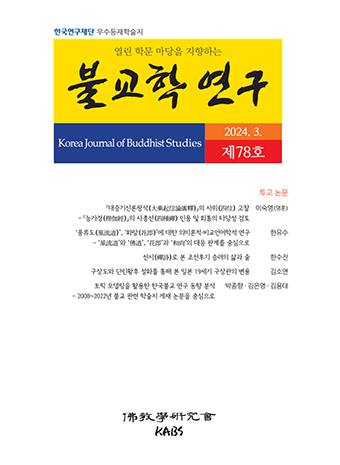Abstract
References
Sorry, not available.
Click the PDF button.
Information
There are many types of meditation methods. It is hard to say which is superior since it depends on the practitioner’s personal temperament and disposition. Even so, one method stands out as easily accessible and acceptable regardless of a practitioner’s religious leaning: breathing meditation. Previous studies on breathing meditation can be largely divided into four types: A traditional Buddhist method, a brain breathing method, breathing practice in yoga, and traditional Taoist breathing meditation (abdominal breathing). Among these, studies on traditional Buddhist breathing meditation may be examined from the three perspectives of literature research, test of medical effects, and test of psychological effects. In this paper, we will examine breathing meditation methods of early Buddhism, which is among the most popular research subjects in this field. To set it apart from earlier studies, we collected all the data on breathing meditation found in an early Buddhist script, Nikāya, and classified them. Our research covers topics ranging from the origin of breathing meditation, to specific methods, practical characteristics, benefits of breathing meditation, and psychological therapeutic effects. Some of the key findings on characteristics of breathing meditation are:What sets Buddhist breathing meditation apart from other breathing meditation is ‘sati’ or mindfulness. Breathing meditation is a method that Buddha practiced even before enlightenment, apart from meditation on impurity. Breathing meditation is a method that was widely practiced by novices and Arahat alike, even by Buddha. Breathing meditation is a useful method of attaining Samādhi. Simply put, breathing meditation is a method of calming down a distracted mind to enable immersion in practice, and at the same time, it is an effective meditation method that helps to achieve a stage of realization by developing one’s wisdom.
오늘날 우리에게 알려진 명상법은 대단히 다양하다. 그 가운데 무엇이 더 좋은가는 개인적 기질이나 성향에 달린 문제이기에 무엇이 더 좋다고 말하기는 쉽지 않다. 그러나 그 많은 명상법 가운데 누구나 접근하기 쉽고, 종교적 성향에 관계없이 할 수 있는 명상법이 있다면, 아마도 그것은 호흡명상일 것이다. 호흡명상에 대한 기존의 선행연구는 크게 4가지 유형으로 구분된다. 첫째는 불교 전통의 호흡명상, 둘째는 뇌 호흡명상, 셋째는 요가의 호흡수행, 넷째는 도가적 전통의 호흡명상(복식호흡)이다. 이 가운데 국내에서 이루어진 불교 전통의 호흡명상 관련 선행연구는 크게 3가지 관점에서 분류해 볼 수 있다. 첫째는 호흡명상에 대한 문헌연구, 둘째는 호흡명상의 의학적 효과 검증, 셋째는 심리학적 효과성 검증이다. 본 논문은 이러한 국내 연구의 배경 속에서 어찌 보면, 가장 대중적인 연구주제 가운데 하나인 초기불교의 호흡명상에 대해 고찰해 보고자 했다. 그리고 차별성을 확보하기 위해 초기경전 니까야 속에서 호흡명상과 관련된 가능한 자료를 모두 찾아 이들 내용을 분류했다. 호흡명상의 유래부터 시작해서 구체적인 방법과 수행론적 특징, 그리고 호흡명상을 통해 얻게 되는 이익과 심리치료적 효과에 대한 내용을 포괄해서 기술하고자 했다. 이상의 내용을 토대로 호흡명상법이 지닌 다양한 위상을 확인할 수 있었다. 그 내용은 다음과 같다. 1. 불교 호흡명상이 다른 호흡전통과 구별되는 점은 호흡에 대한 사띠, 즉 알아차림에 있다. 2. 호흡명상은 부정관과는 관련없이 붓다가 정각 이전부터 수행해 온 명상법이다. 3. 호흡명상은 초보자부터 아라한, 심지어 붓다도 즐겨했던 명상법이다. 4. 호흡명상은 삼매를 획득하는데 유용한 방법이다. 5. 호흡명상은 단순하게는 산란한 마음을 가라앉혀 수행에 몰입할 수 있도록 이끄는 방법이지만, 다른 한편 지혜를 계발하여 번뇌를 제거하는데 도움을 주는 것으로 이어져 성인의 과위를 성취하게 하는데 효과적인 명상법이기도 하다.
Click the PDF button.
- Publisher :Korean Association of Buddhist Studies
- Publisher(Ko) :불교학연구회
- Journal Title :Korea Journal of Buddhist Studies
- Journal Title(Ko) :불교학연구
- Volume : 47
- No :0
- Pages :109~134


 Korea Journal of Buddhist Studies
Korea Journal of Buddhist Studies






